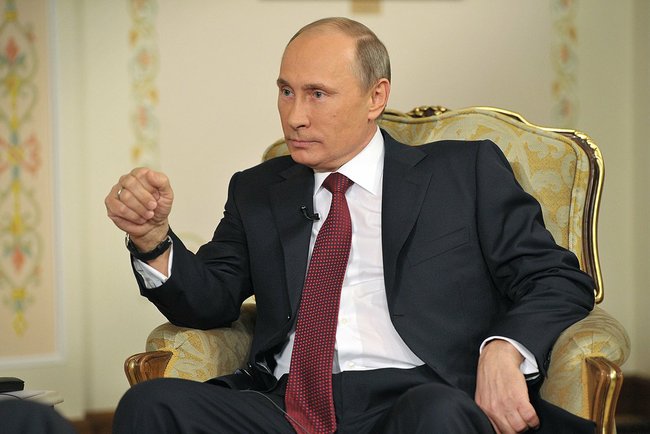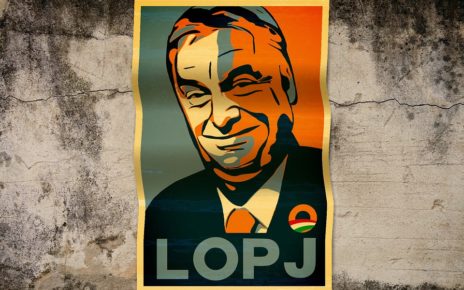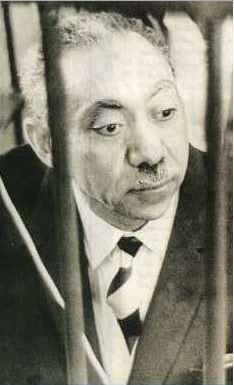In an October 3 interview on 60 Minutes, Vladimir Putin sat down with Charlie Rose to discuss American-Russian relations, nuclear proliferation and Russia’s ambitions in Syria and Ukraine. One of the highlights came after Rose pressed Putin on his assertion that “the worst thing to happen in the last century was the collapse of the Soviet empire” and asked whether there exists a desire for Russia to rebuild that sphere of influence. Putin initially laughed at the question, claiming that the Russian government is always suspected of unbenign ambitions, but then he became serious and told Rose, “in an instant 25 million Russian people found themselves beyond the borders of the Russian State… the separation of families, social problems, economic problems… Russia was the biggest divided nation in the world. It’s not a problem? Well maybe not for you. But it’s a problem for me.”
Putin’s emotional concern for families being torn apart seems counter intuitive as it was precisely the exertion of Soviet control that forcefully divided families for decades in Germany, Poland, Lithuania, Ukraine and other bloc states. In fact, it was not until the Helsinki Declaration in 1975 that the Soviets even agreed to cooperate with other nations on allowing freer travel, inter-state marriages and the reunification of families. Prior to this, many individuals seeking to emigrate from the Soviet Union were met with coercive measures such as having their employment terminated, their possessions confiscated and permitting only certain members of the requesting family to leave.
It is clear that Putin’s compassionate reflection did not extend to those families. Rather than tearing people apart, the collapse of the Soviet Union, and the subsequent fall of the Berlin Wall, allowed countless families to reunite. The former satellite countries were indeed broken up and divided into separate states, but with that came the destruction of the arbitrary restrictions and walls to human mobility set in place under the Soviet regime. The division Putin was referring to was the receding control and reach of the Russian state over its former citizens and territory.

It seems hyperbolic for Putin to equate the dissolution of the Soviet Union as the worst thing to happen in the 20th Century, even from a Russian perspective, considering the massive economic and human losses incurred as a result of World War II, but it does speak to Putin’s perspective as the leader of a former empire who is conscious of cementing his place in history. It is reasonable to think that a head of state would reflect on a period of great strength and influence in their country’s history and attempt to reclaim it. For instance, in the 18th and 19th centuries we could hardly fault the successors of King George III from envisioning a British Empire which still presided over the United States or fault the French, Portuguese and Spanish monarchs for vying for the degree of influence they once exerted on the world stage.
Putin’s actions in Ukraine and Syria make it plain that he does seek to broaden Russia’s influence in the world, and his vehicle for doing so is reinstating the dissolved governance in regions which have former Russian citizens. This was his entire rationale for entering Crimea. It was not to be perceived as an act of conquest and annexation as much as it was a rightful claim to govern citizens who identify as being Russian with kindred blood, traditions, histories and institutions.
Putin’s intention to govern these citizens is not limited to this purported benevolence, but his sense of preventive justice as well. This is clear in his discussion of the Syrian conflict when he stated that “2,000 fighters from Russia in Ex-Soviet Republics are in the territory of Syria. There is a threat of their return to us… we are better off helping Assad fight them on Syrian territory”. Once again, albeit in a different context, Putin is expressing that he has the legitimate right to expand Russia’s hegemonic reach onto another country based on the ethnic composition of its citizens. It is a rationale that serves as a guise for what, in practice, is the political and territorial expansion of the Russian state.
The legitimization of Russian intervention harkens back to the Brezhnev doctrine in an appeal to political preservation grounded on simultaneously reducing the influence of the West while bolstering the influence of the Russian state. Putin has already shown a disregard for sovereign borders in Georgia, Ukraine, Syria and more recently in Turkey. The challenge facing international actors now is predicting how exactly Russian expansionism will manifest itself in the Middle East and Europe and how best to combat it. Fortunately, those in opposition to Putin’s ambitions do not have to pry behind an iron curtain to uncover what they are; they need only listen to him speak.



